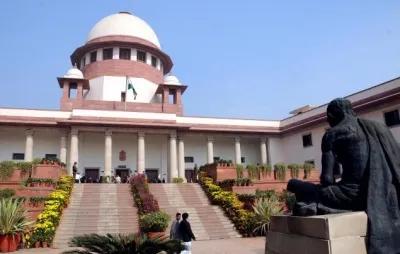New Delhi: Solicitor General (SG) Tushar Mehta, appearing for the Union government, told the Constitution Bench of the Supreme Court on Monday that Article 35A providing its application only to Jammu and Kashmir created an “artificial class”.
Mehta told the court said that Article 35A created a new provision in the Constitution of India to be applied only to “permanent residents” of Jammu and Kashmir.
Attorney General R. Venkataramani strengthened SG’s submission by contending that “Article 35A is not a modification of Article 35 but it is a creation of a new article under the Constitution.”
He said that similarly situated persons, like safai karamcharis settled for years, who did not come within the artificially-created definition of “permanent residents”, were completely deprived of all fundamental rights in J&K.
During the hearing, he said that if a resident lady married outside J&K, she lost her permanent residentship, adding that Article 370 from the very beginning was conceived as a temporary provision.
Mehta questioned the political parties of the state who moved the Supreme Court challenging nullification of Article 370, saying that they were supposed to “guide” the residents of Jammu and Kashmir over its abrogation as it would open up progress in the region.
“Your lordships have at least two major political (parties) defending (retention) of Article 370, including Article 35A,” he said, disclaiming that he is not being “political.”
He added: “That till now the people were convinced by those (referring to political parties).... that this a privilege you fight that nobody could take away Article 370 from you. That is the most unfortunate part.”
Mehta said that there were many provisions which were working against the interest of the people, but the residents were convinced for retention of Article 370.
“Now they have realised what they have lost. Because of Article 35A not being there, investments are coming. Now policing being with the Centre, tourism has started... by now, 16 lakhs tourists have come. New hotels are coming up which give employment to a large number of people,” Mehta contended.
He requested the Constitutional Bench to have a “relook” from the perspective of the people of J&K.
“Please look at the matter from the point of view of the people of J&K. The impugned constitutional exercise of power confers fundamental rights and applies the entire Constitution to bring them at par with the rest of their other brothers and sisters and applies all welfare laws which were not applicable (prior to abrogation of Article 370),” he said.
Mehta argued that the J&K Constitution and its Constituent Assembly were meant to be subordinate to the Indian Constitution. He contended that signing of merger agreements by states was not mandatory for integration with dominion of India.
Defending the substitution of 'Legislative Assembly' for 'Constituent Assembly', he contended that whenever a word becomes otiose in Article 370, the same is replaced by its successor.
He illustrated that “Sadr-e-Riyasat” later became “Governor” in the context of Article 370.
Earlier, the Centre had said that the judgment of the Constitution Bench of the Supreme Court, going either way, will be ‘historic’ and would end the ‘psychological duality’ which existed in the minds of the residents of Jammu and Kashmir.
Notably, a five-judge Constitution Bench headed by Chief Justice of India D.Y. Chandrachud is hearing a clutch of petitions challenging the 2019 Presidential Order taking away the special status accorded to the erstwhile state of Jammu and Kashmir and its bifurcation into two Union Territories.
The Constitution Bench, also comprising Justices Sanjay Kishan Kaul, Sanjiv Khanna, B.R. Gavai, and Surya Kant, will continue hearing the matter on Tuesday. —IANS

